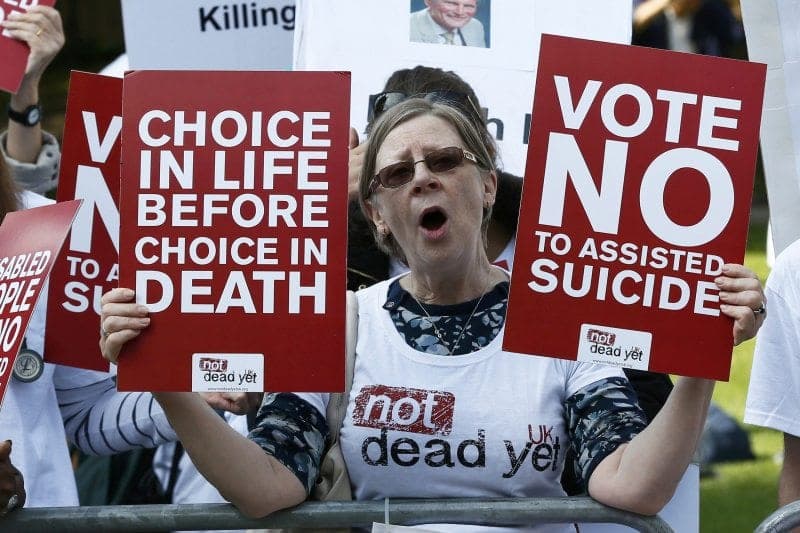No normal person wants to see another human being suffer. When we see those struggling with pain or deteriorating health, we naturally and rightly feel compassion, but there are different ways to respond.
One way is to simply become indifferent. Sadly, this is the response of many in our world today.
From unwanted unborn children to migrants lost at sea as they flee violence to children dying of starvation at a time when the world produces enough food to feed every person on the planet, there are far too many people who are treated as outcasts, excluded from any consideration as we live our daily lives.
We can respond to those suffering during the twilight of their lives with similar indifference.
Yet we are called to protect the vulnerable. We are called to build a culture of inclusion rather than exclusion. We are called to extend solidarity to those at the margins, those ignored by the rich and powerful.
A second option is to remove this suffering and pain by taking the person’s life. But this is just another form of exclusion and discarding the person. If we truly believe in equality, we must value every life, regardless of the person’s station in life and their health.
We do not give up on people when they are weak and they suffer. We do not cast them aside when they no longer can be used to achieve some utilitarian goals. Human beings are not a means to an end; they are not objects used to achieve social goals.
Euthanasia and physician-assisted suicide might seem to offer a shortcut to the society we hope to achieve, but that shortcut takes us off the right path and into the woods, never to arrive at the destination we seek: A culture that values all people.
A culture that values all people must value all human life. When a government or society begins to determine who is worthy of life and which lives can be discarded, we begin to edge our way down a slippery slope.
It may start with voluntary deaths for those suffering most whose death is imminent. But soon the message is sent to all: There may be a point when you are no longer needed on this earth and it would best for you to take your own life. The worst circumstances morph into the more mundane (as the notion of a right to die takes hold), protections against coercion erode.
The message that human life is intrinsically valuable, not something we can simply throw away when it is inconvenient, is sent to all, including those who fear they may be too much of a burden to others to keep on living.
A third option is the right option for those who value the life of every person, including the weakest and most vulnerable: To oppose the killing of all innocent people and to provide assistance to those struggling in difficult circumstances.
If we decide that allowing the killing of those suffering is an appropriate response, where is the incentive to provide assistance to the poor and vulnerable who want and need help? If we have already decided that their lives are of such little value that they can be killed, will we really do everything in our power to help those who recognize their own worth and the sanctity of their own lives?
The right answer to suffering is not to abandon the vulnerable.
It was therefore encouraging when SB 128, California’s assisted suicide bill, was shelved for the remainder of the year (or so we thought) by California lawmakers last year. The concerns expressed by California lawmakers like Assemblywoman Lorena Gonzalez showed this commitment to the poor and vulnerable. Gonzalez explained:
“I’m uncomfortable based on the experiences of my mom, who died of terminal illness. I’m uncomfortable based on the impact this will have on poor people in a health care system that cuts corners in the name of costs, and I’m uncomfortable with the way suicide could be viewed across society, not just the terminally ill.”
Yet through legislative gymnastics, assisted suicide legislation was revived, and it was signed into law by California Governor Jerry Brown last October, over the concerns of disability groups, the American Medical Association, and the Catholic Church.
This issue raises important questions. Do we want to fight for a healthcare system that refuses to discard people in order to cut costs? Do we want to fight for assistance that will ease suffering rather than end lives?
Compassion must motivate us, but it should push us toward creating a more just society that reflects the dignity and equality of all, not a simplistic effort to end suffering by ending the person’s life.
The battle over assisted suicide in California is just the beginning; the fight will continue across the country. Americans will be faced with the same choice: fight for the lives of the poor and vulnerable or cast them aside. We should choose equality, dignity, and life.
Kristen Day is the executive director of Democrats For Life of America.


















